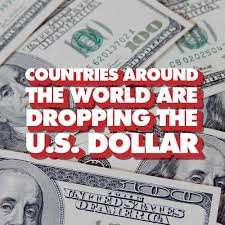job prospects during de-dollarization
De-dollarization is a process whereby a country reduces or eliminates its dependence on the US dollar as a primary means of international trade, financial transactions, and reserve currency. This phenomenon has been gaining momentum in recent years, particularly in countries that have traditionally relied heavily on the US dollar. This essay will explore the prospects of job creation during de-dollarization, focusing on how it could affect various sectors of the economy, including trade, finance, and manufacturing.


De-dollarization is a process whereby a country reduces or eliminates its dependence on the US dollar as a primary means of international trade, financial transactions, and reserve currency. This phenomenon has been gaining momentum in recent years, particularly in countries that have traditionally relied heavily on the US dollar. This essay will explore the prospects of job creation during de-dollarization, focusing on how it could affect various sectors of the economy, including trade, finance, and manufacturing.
The Impact of De-dollarization on Trade
De-dollarization can have a significant impact on a country's trade balance. When a country reduces its reliance on the US dollar, it becomes less vulnerable to currency fluctuations and exchange rate risks. This, in turn, can lead to more stable trade relationships with other countries, particularly those that have also de-dollarized.
However, de-dollarization can also create some challenges for exporters. For example, if a country's trading partners are still heavily dependent on the US dollar, it may be more difficult to price goods and services competitively. Additionally, if a country's own currency becomes the primary means of international trade, it may be subject to greater scrutiny from trading partners who are less familiar with its currency.
Despite these challenges, de-dollarization can create opportunities for job growth in the trade sector. For example, as countries shift away from the US dollar, there may be increased demand for workers with expertise in alternative payment systems and currencies. Additionally, there may be new opportunities for importers and exporters to collaborate on trade deals that are denominated in non-US dollar currencies. This could lead to increased demand for workers in the shipping, logistics, and freight industries.
The Impact of De-dollarization on Finance
De-dollarization can have significant impacts on the financial sector, particularly in countries that have traditionally relied heavily on US dollar-denominated debt. When a country reduces its dependence on the US dollar, it may be able to reduce its overall debt burden and reduce the risk of currency fluctuations. This, in turn, can lead to increased stability in the financial sector.
However, de-dollarization can also create challenges for financial institutions. For example, if a country's currency becomes the primary means of international trade, there may be increased pressure on financial institutions to develop new financial products and services that are denominated in that currency. Additionally, if a country's currency is less familiar to international investors, it may be more difficult to attract foreign investment.
Despite these challenges, de-dollarization can create opportunities for job growth in the financial sector. For example, as countries develop new financial products and services, there may be increased demand for workers with expertise in alternative currencies and payment systems. Additionally, there may be new opportunities for financial institutions to develop relationships with other countries that have also de-dollarized.
The Impact of De-dollarization on Manufacturing
De-dollarization can also have significant impacts on the manufacturing sector. When a country reduces its dependence on the US dollar, it may become more competitive in international markets. This is because the cost of manufacturing goods in a de-dollarized country may be lower due to reduced currency risk and increased access to non-US dollar-denominated financing.
However, de-dollarization can also create challenges for manufacturers. For example, if a country's trading partners are still heavily dependent on the US dollar, it may be more difficult to price goods and services competitively. Additionally, if a country's own currency becomes the primary means of international trade, it may be subject to greater scrutiny from trading partners who are less familiar with its currency.
Despite these challenges, de-dollarization can create opportunities for job growth in the manufacturing sector. For example, as countries become more competitive in international markets, there may be increased demand for workers in manufacturing industries that produce goods for export. Additionally, as countries develop new trade
What's Your Reaction?






















